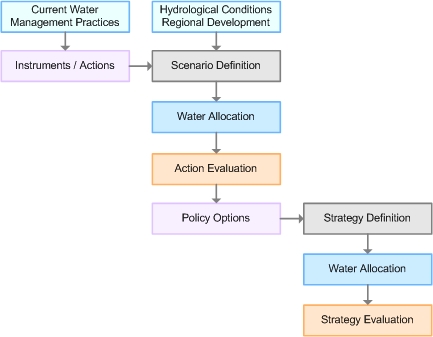The comparison of alternative water management scenarios, based on selected user-defined criteria, allows the identification of the appropriate plans, actions and pricing policies that apply to each paradigm. For this, the Strategy Formulation Phase includes three Work Packages.
-
WP8
refers to the development, analysis and comparison of alternative water allocation scenarios for each Paradigm. Part of the forecasting exercise will be based upon the definition of scenarios and the selection of alternative actions (alternatives) and policies (incentivesrestrictions to drainage water re-use, cropping, settlement, different management policies of the available resources, or a combination of those). Special attention will be placed on the assessment of uncertainty.
-
WP9 refers to the formulation and evaluation of alternative water management options focusing on water cost recovery strategies.
-
WP10 refers to the development of general guidelines and protocols for improved water management strategies in water deficient regions based on the synthesis of the results from the evaluated Paradigms.
-
In WP11, on the basis of the strategies, the range of the existing circumstances and the lessons learned, a protocol for implementing integrated water management strategies will be developed.
The critical stage of Strategy formulation that is just being initiated includes the development and assessment of coherent water management scenarios on water demands and availability that will be used to evaluate alternative water management strategies, set against the base case in each case study.

Figure 1. Steps in Scenario and Strategy Evaluation
The scenarios include 3 components: a demand scenario component that involves demand forecasting, a hydrological scenario component based on existing hydrological series and/or hypothetical time series, and finally an intervention, meaning a management measure, action or sequence of actions. These interventions refer to both supply and demand-side measures, as well as economic instruments, that are available for the management of water resources. The approach is adaptable, to suit regions with similar characteristics, as opposed to rigid and tailor-made for the specific region of application.
The comprehensive scenarios will be evaluated against the base case to provide a ranking of selected measures and/or strategies with respect to their performance and applicability in the conditions of the water system analysed in the DSS simulation (Figure 1).
Top